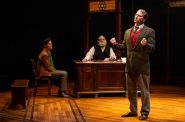Florentine’s Baroque double bill is pitch-perfect

Ensemble dances “The Three Graces,” by Dani Kuepper. Florentine photo by Kathy Wittman, Ball Square Films.
Carriage counts for almost as much as singing in the Florentine Opera staging of John Blow’s Venus and Adonis and Henry Purcell’s Dido and Aeneas, which opened Friday Vogel Hall of the Marcus Center. The Florentine’s singing actors carry themselves as if they’ve grown up with fencing and dancing masters. The lengthened spines, noble shoulders and graceful tread please the eye throughout, but especially in the wonderful little dances that Dani Kuepper created for the singers.
That carriage also seals the deal on the smart theatrical conceits director William Florescu and scenic/lighting designer Noele Stollmack dreamed up.
Nobles sometimes took roles in Baroque entertainments. This cast plays nobles at a rehearsal on an nearly finished set adorned with ladders, bits of stage machinery and boxes of props. This savvy concept neatly sidesteps the narrow scenic limitations of Vogel Hall.
During the overtures, the “amateur” actors chat as they come to places and search out the right prop or headgear. When the overtures end and the show “starts,” the singers fall into pleasing symmetries and adopt somewhat more stylized poses to indicate their roles. We look at them and see three layers: The American kids we know they are, the nobles they pretend to be, and the gods and shepherds the nobles pretend to be.
Music feels like the inevitable extension of the cast’s way of moving; of the décor; of Dawn Rivard’s flowing wigs; of Christianne Meyers’s costumes (gold and off-white confections of breeches, corsets and paniers, with splashes of color for the principals); and even of the charming way 11 Milwaukee Symphony string players deploy single file along the apron of the stage, on either side of keyboardist/conductor Christopher Larkin. Of course people would converse in song in such an exquisite artificial world. What could be more natural?
The singing ranged from very good to spectacular. Ian Howell, as Cupid in Venus and the deceiving spirit messenger in Dido, delivered some of the most beautiful and expressively shaded counter-tenor singing I’ve ever heard. He also moved and posed elegantly.
Greer Davis showed great agility in two taxing roles, Venus and then Belinda, Dido’s confidante. Her timbre is brilliant but never shrill and always rich. Davis is a superb musician. She hits pitch on the money, and she conspired with Larkin to flex the rhythm but keep it taut throughout her highly ornamented lines.
Craig Verm’s potent, lush baritone suits Adonis and Aeneas. Florescu and Verm conceived Adonis as essentially comic (until the poor fellow dies). Rivard and Meyers put him in a Fabio wig and beefcake outfit. Verm (who’s pretty buff) leaned into Davis’ fetching Venus with great and persistent ardor. Her deflections make for nifty comedy, even as the chemistry between them adds sex appeal (and one more thing to love about this show).
Verm’s Aeneas is more complicated than his Adonis. This aligns with Florescu’s idea of the opera being as much about politics as love. The way the Florentine plays it, Carthage is in a bad way and needs Aeneas’ leadership and the small army he commands. Belinda, rather than a mere nanny, brokers the power in this deal. Florescu and his cast seized on the barest threads of this notion in the libretto and they made it stick, through very subtle blocking, body language and glances. When Dido dies, Belinda backs out of the scene and does not join in the memorial chorus; as the insider of a failed, dead queen, she has to get out of Dodge.
Everyone in the cast had his or her solo moment, and everyone did very well. They were even better in the abundant, important and gorgeous choral sections. So here’s to chorus master Scott Stewart, production pianist/coach Yasuko Oura, and to singing actors Kristin Ngchee, Scott Johnson, Erica Schuller, Julia Elise Hardin, Matthew Richardson and Jean Broekhuizen.
The Florentine’s Baroque double-bill repeats at 7:30 p.m. Friday and Saturday and 2:30 p.m. Sunday, May, 13-15; 7:30 p.m. Wednesday, Thursday and Saturday, May 18,19 and 21; and 2:30 p.m. Sunday, May 22. (That’s right; no show Friday, May 20). Tickets are $30-$108 at the Florentine ticket line, 414 291-5700 ext. 224, the Marcus center box office, 414 273-7206, and the Florentine’s website.
Theater
-
‘L’Appartement’ Is a Mind-Bending Comedy
 Mar 25th, 2024 by Dominique Paul Noth
Mar 25th, 2024 by Dominique Paul Noth
-
‘The Mountaintop’ Offers Very Human Martin Luther King Jr.
 Mar 11th, 2024 by Dominique Paul Noth
Mar 11th, 2024 by Dominique Paul Noth
-
‘The Chosen’ Is Subtly Powerful Drama
 Mar 10th, 2024 by Dominique Paul Noth
Mar 10th, 2024 by Dominique Paul Noth


















